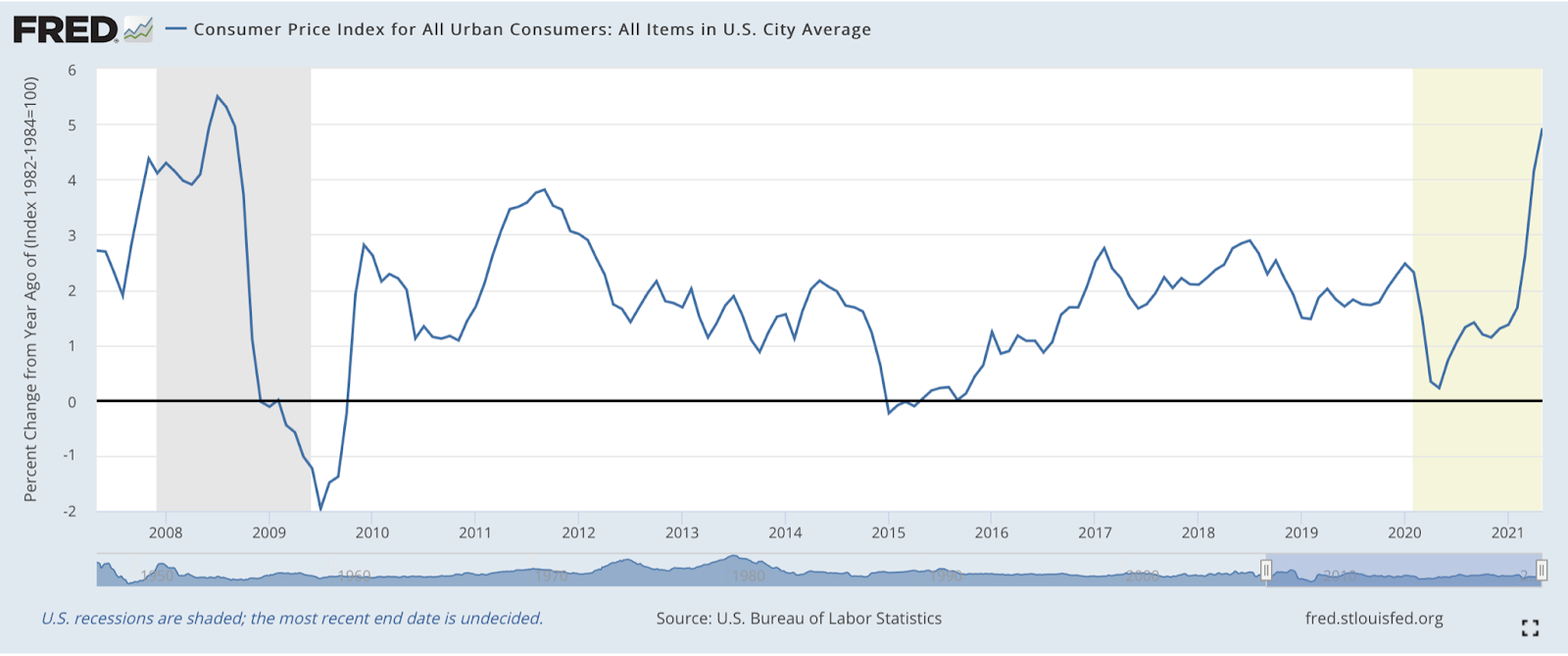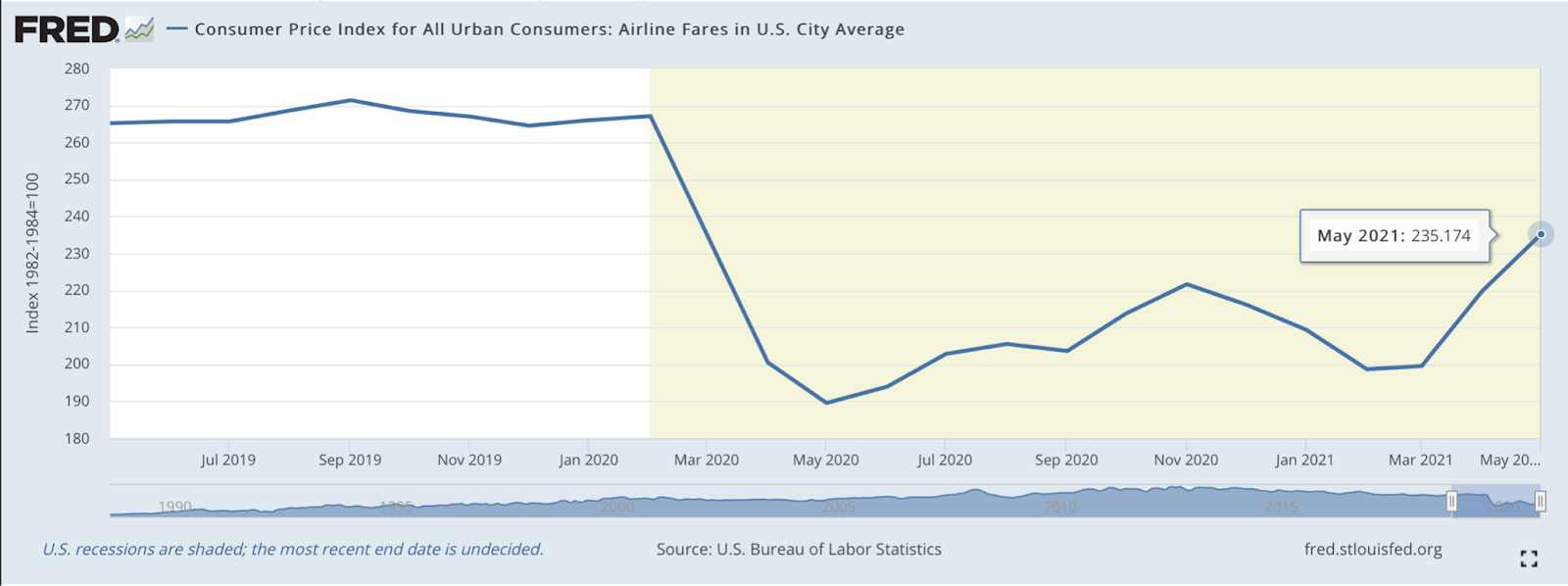Happy Friday! The finishing touches were put on this newsletter from Gate 53 at Reagan National Airport, where one of your Morning Dispatchers sat for six hours waiting for a delayed flight after his plane was struck by lightning.
Quick Hits: Today’s Top Stories
-
A Thursday Bureau of Labor Statistics report showed inflation remaining at elevated levels, with the Consumer Price Index surging 5 percent year-over-year in May. The growth was largely driven by used cars and trucks, the cost of which rose 7.3 percent in May.
-
Initial jobless claims decreased by 9,000 week-over-week to 376,000 last week, the Labor Department reported on Thursday, the lowest level since March 14, 2020. Initial jobless claims have now fallen for six straight weeks.
-
A group of 12 House Democrats led by Rep. Brad Schneider (D-Illinois) issued a statement condemning Democratic Rep. Ilhan Omar following her comments equating the United States and Israel with Hamas and the Taliban. After initially dismissing the criticism as “Islamophobic,” Omar put out a statement “clarifying” that she was “in no way equating terrorist organizations with democratic countries.” House Democratic leadership—including Speaker Nancy Pelosi, Majority Leader Steny Hoyer, and Majority Whip Jim Clyburn—issued a press release “welcom[ing] the clarification” from Omar.
-
Aung San Suu Kyi, Myanmar’s former civilian leader who was deposed by a military coup in February, faces new charges of corruption brought by current authorities, allegations that carry a maximum prison sentence of 15 years. Suu Kyi is accused of accepting $600,000 in cash and gold during her time in office.
-
The Biden administration announced it is lifting sanctions on three former Iranian government officials, as well as two companies involved in selling and transporting Iranian petrochemical products. In a statement, Secretary of State Antony Blinken said the decision “demonstrates our commitment to lifting sanctions in the event of a change in status or behavior by sanctioned persons.” State Department spokesman Ned Price claimed Thursday the actions have “absolutely no connection” to ongoing nuclear talks.
-
The United States confirmed 12,294 new cases of COVID-19 yesterday per the Johns Hopkins University COVID-19 Dashboard, with 1.8 percent of the 700,369 tests reported coming back positive. According to the Centers for Disease Control, 16,142 Americans are currently hospitalized with COVID-19. Meanwhile, 934,142 COVID-19 vaccine doses were administered yesterday, with 172,423,605 Americans having now received at least one dose. (There were some inconsistencies with the mortality data yesterday.)

Inflation Isn’t Going Anywhere Just Yet
When we wrote about higher-than-expected inflation last month, many of the experts we talked to urged against drawing sweeping conclusions from one month of data amid a unique set of economic circumstances.
“Much of the increase is based on a low starting point last April, and core inflation is lower than the headline number we’ve seen,” Manhattan Institute senior fellow Brian Riedl told The Dispatch. “So I think we need to wait a couple more months to see how bad it’s going to be.”
Well, it’s been a month, and the Bureau of Labor Statistics provided another glimpse into inflationary pressures Thursday with the release of its Consumer Price Index (CPI) report. The CPI increased 0.6 percent from April to May, and 5 percent year-over-year. Both figures outpaced economists’ consensus forecasts (0.5 percent and 4.7 percent, respectively), and the latter represented the fastest year-over-year price growth since 2008.

But looking under the hood of the topline numbers, these increases have not affected all economic sectors equally. The overall price of food and shelter has increased only 2.2 percent since May 2020, well within the Federal Reserve’s flexible 2 percent average inflation target (though bacon is up 13 percent!). If you want to move from one place to another without using your feet, however, it’s going to cost you an arm and a leg: Gasoline prices are up 56.2 percent year-over-year, used cars and trucks 29.7 percent, car and truck rentals 109.8 percent, airline fares 24.1 percent, and bicycles 10.1 percent.
It’s here, however, where it’s worth keeping in mind the base effect: The economy—and American society as a whole—was very strictly locked down last May, leading demand for (and the price of) many goods and services to plummet. Gasoline prices, for example, are up 56.2 percent from May 2020, but just 3.4 percent from May 2019. The phenomenon is even starker with airfare. Plane tickets are, on average, 24.1 percent more expensive now than they were a year ago. But they’re actually 11.3 percent cheaper than they were two years ago.

This isn’t the case with every product included in the CPI. The price of used cars and trucks has skyrocketed no matter where you start the count from, and the same goes for lumber. Those increases have far more to do with rejiggered supply chains being unable to keep up with renewed demand as we put the pandemic behind us. The Biden administration—and more crucially, the Fed—have signalled they believe this to be a temporary phenomenon that will normalize in a couple of months.
“Today’s data on inflation is the latest indicator that things are both moving in the right direction and that we have supply-chain hiccups,” tweeted Heather Boushey, member of the White House Counsel of Economic Advisors.
“Yes, it is true the prices for AIRLINE TICKETS and USED CARS were up a great deal in May of 2021 over where they were in May of 2020—when everyone was coping with the worst of the pandemic!” White House Chief of Staff Ron Klain added before retweeting a New York Magazine article titled “Why Inflation Is Lower Than It Looks.”
But there are real reasons to believe some of the inflationary pressures we’re seeing are not just a blip—and that rising prices are something policymakers in Congress and at the Federal Reserve will need to take into account in the coming months and years. Last week’s jobs report found average hourly earnings grew 0.5 percent from April to May (a 6 percent clip on an annual basis), and many businesses have already made clear their plans to pass those higher labor costs on to consumers.
Chipotle executives announced this week the fast-casual chain will be raising prices by about 4 percent to offset some of the costs of the tighter labor market. Procter & Gamble warned customers earlier this year to expect mid- to high-single-digit percentage point price increases on staples like diapers and tampons. A Factset analysis of the first-quarter earnings calls of S&P 500 companies found the word “inflation” was mentioned more times last quarter than any quarter dating back to 2010. The May 2021 NFIB Small Business Economic Trends survey found 48 percent of small businesses reported raising their prices, compared with just 5 percent that reported lowering them.
“We should all be very concerned. It’s long overdue for the Fed to begin the process of normalizing its monetary policy,” GOP Sen. Pat Toomey argued yesterday. “The combination of the Fed’s average inflation targeting and its view that inflation will be transitory virtually guarantees the Fed will be behind the curve if inflation is enduring. Congress’ massive spending contributes to the problem. It’s time to end it.”
That seems unlikely, however. Last night, a bipartisan group of 10 senators announced they had reached an agreement on an approximately $1 trillion infrastructure package that includes roughly $580 billion in new spending over the next five years. It’s unclear if the deal—hammered out by five Democrats and five Republicans—will be able to garner the support of both an additional five Republicans and the White House.
Tigray Crisis Continues
We’ve written previously about the ongoing crisis in the Tigray region of Ethiopia, which borders Eritrea and Sudan. But the humanitarian problems have worsened as fighting continues without regard for Tigray’s civilian population. The U.N. World Food Program (WFP) announced yesterday that more than 4 million people in the Tigray now face severe hunger, with 350,000 of them at risk of famine. The threat, according to the U.N., is the worst a single country has faced in the last decade.
U.S. Agency for International Development (USAID) Administrator Samantha Power held a series of high-level meetings on Tigray this week, including donor countries, individuals, and other organizations. During the meetings, Power announced an additional $181 million in USAID assistance directed toward Ethiopians.
The violence in Tigray began in November 2020, when Prime Minister Abiy Ahmed ordered Ehthiopian troops to respond to alleged attacks on a military camp by the Tigrayan People’s Liberation Front (TPLF). The TPLF was designated a terrorist organization in May by the Ethiopian central government, which cited the group’s practice of targeting civilians and public infrastructure. Previously the TPLF had been an accepted member of Ethiopia’s political landscape. “TPLF is not a typical insurgent group, but a militarily equipped and experienced ex-government organization,” according to a HORN Institute report written just after the terrorist designation was announced.
Regional leaders in Tigray decried Abiy’s decision to delay elections due to COVID-19 concerns. Despite Abiy’s delay, the Tigray region held parliamentary elections, which were later deemed illegitimate by the central government.
Eritrea entered the conflict alongside Ethiopia’s central government, unacknowledged by Abiy until March 2021, when he announced Eritrean forces would soon withdraw.
Eritrean-Ethiopian relations have been rocky for decades. Eritrea was formerly a part of Ethiopia but formally declared independence in 1993. However, a border dispute between 1998 and 2000 left 70,000 people dead. In 2016, the U.N. Human Rights Council (UNHRC) appealed to the African Union to investigate alleged crimes against humanity perpetrated by the Eritrean government. In 2018, the U.N. Security Council ended nearly a decade of sanctions on Eritrea after a peace between Ethiopia and Eritrea was reached.
But Eritrean forces are still on the ground in Ethiopia, reportedly wearing dated Ethiopian military uniforms, and committing brutal acts of violence. Ethiopian forces are also accused of committing war crimes. There is a secondary debate occuring to determine whether the attrocities occuring in Tigray amount to “genocide” or “crimes against humanity.”
While the exact determination of the crimes remains to be made, it is clear that civilians are faced with imminent threats of violence and starvation. Thousands of people have been killed, and as many as 2 million people have been displaced in the region to date.
Military forces remain in control of the region, regularly blocking U.N. operations from delivering food aid. The WFP outlines three necessities in order to avoid mass starvation: “a ceasefire, unimpeded access for WFP and partners to all areas, and the money to expand our operations to meet the growing numbers of people who desperately need emergency food assistance.”
In May 2018, the Security Council unanimously adopted resolution 2417, affirming that starvation as a method of war constitutes a war crime. The U.N. announced a probe into war crimes and human rights violations in Tigray in March. There are calls for the International Criminal Court to investigate the charges as well. Ethiopia is not a signatory of the ICC, however, and is therefore outside its jurisdiction.
Worth Your Time
-
The Claremont Institute’s Christopher Caldwell took to the New York Times yesterday in defense of West Virginia Sen. Joe Manchin’s decision to uphold the filibuster and sink H.R.1. “Maintaining wide and equal access to ballots is a democratic necessity. If it were the only necessity, the For the People Act would be unobjectionable, and Mr. Manchin’s misgivings idle. But there is a second necessity: simplicity. The public will trust a voting system only to the extent that it is comprehensible and resistant to manipulation,” Caldwell writes.
-
In the Heights—the cinematic remake of Lin-Manuel Miranda’s 2005 musical of the same name—is in theaters (and on HBO Max) today, and Reason’s Peter Suderman gave it a favorable review. “I admit to being what you might call a curmudgeon, which [is] a long way of saying that I am very much not the target for In the Heights. … This movie isn’t for me,” he writes. “And yet, somehow, I found it rather charming, even heartwarming. I don’t know if it’s a great movie, but it’s a gentle and genuinely appealing production, buoyed by a message of DIY community building and entrepreneurial advancement.”
Presented Without Comment
Toeing the Company Line
-
On yesterday’s Advisory Opinions, David and Sarah reviewed Justice Thomas’s unexpected concurrence in Borden v. United States, a case about how broadly the government can define “use of force.” They then discuss a controversial Virginia case involving a school suspending a professor for not using students’ preferred pronouns, and the announcement that the Texas Bar Association will investigate Ken Paxton for his lawsuit to overturn the 2020 election.
-
Chris Stirewalt is joined by NBC’s Steve Kornacki in this week’s Hangover for a discussion of how our changing electorate has contributed to our sense of political chaos from the ‘90s until now. Chris and Steve discuss whether the GOP can once again champion a sensible and popular agenda.
-
In his Thursday French Press (🔒), David argues that the conservative legal movement is on a collision course with the new right. “The conservative legal movement is currently fighting a series of court battles, at all levels of the American courts, to weaken the ability of state actors to limit the liberty of government employees, government grantees, and participants in government programs,” he writes. “The new right, by contrast, is vigorously proposing, supporting, and passing bills that contradict decades of conservative thought and violate volumes of hard-fought conservative precedent by seeking to strengthen government control over speech in the context of government employment, funding, and contracting.”
Let Us Know
Are you yet feeling inflationary pressures directly in your own life? At the gas pump? Building something with lumber?
Reporting by Declan Garvey (@declanpgarvey), Andrew Egger (@EggerDC), Haley Byrd Wilt (@byrdinator), Charlotte Lawson (@charlotteUVA), Ryan Brown (@RyanP_Brown), Harvest Prude (@HarvestPrude), Tripp Grebe (@tripper_grebe), Emma Rogers (@emw_96), Price St. Clair (@PriceStClair1), Jonathan Chew (@JonathanChew19), and Steve Hayes (@stephenfhayes).






Please note that we at The Dispatch hold ourselves, our work, and our commenters to a higher standard than other places on the internet. We welcome comments that foster genuine debate or discussion—including comments critical of us or our work—but responses that include ad hominem attacks on fellow Dispatch members or are intended to stoke fear and anger may be moderated.
You are currently using a limited time guest pass and do not have access to commenting. Consider subscribing to join the conversation.
With your membership, you only have the ability to comment on The Morning Dispatch articles. Consider upgrading to join the conversation everywhere.